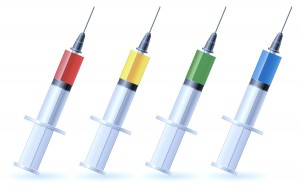 The Oregon Veterinary Medical Association warns that Easter lilies are incredibly toxic to cats causing kidney failure if ingested.  All parts of the plant are poisonous—including the pollen they lick off their own fur.  There is no cure, so it’s important you get your cat to a vet if you suspect ingestion of any of the plant.  Early signs of poisoning are vomiting, loss of appetite, lethargy and dehydration.  Tiger lilies, Day lilies and Asiatic lilies are also toxic to cats.
The Oregon Veterinary Medical Association warns that Easter lilies are incredibly toxic to cats causing kidney failure if ingested.  All parts of the plant are poisonous—including the pollen they lick off their own fur.  There is no cure, so it’s important you get your cat to a vet if you suspect ingestion of any of the plant.  Early signs of poisoning are vomiting, loss of appetite, lethargy and dehydration.  Tiger lilies, Day lilies and Asiatic lilies are also toxic to cats.
Ingestion of fake Easter grass is another hazard. Â It can wrap around the base of the tongue or cause serious intestinal blockage requiring surgery to remove.
Of course, chocolate is another hazard, with darker chocolate being more hazardous.  If you suspect your pet has eaten any of these things, contact your vet or if you’re in North America, the Pet Poison Helpline: 1-800-213-6680


